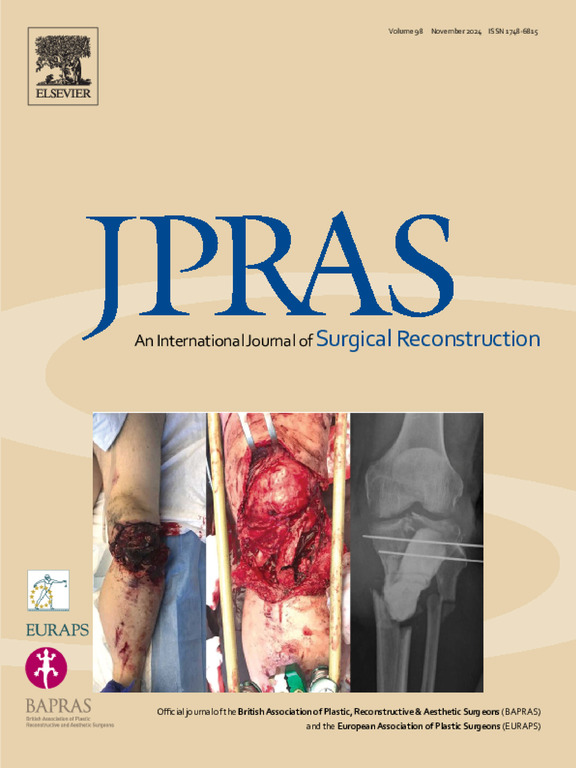Association between cervical lymph node dissection and dementia: a retrospective analysis
IF 2
3区 医学
Q2 SURGERY
Journal of Plastic Reconstructive and Aesthetic Surgery
Pub Date : 2024-10-11
DOI:10.1016/j.bjps.2024.10.002
引用次数: 0
Abstract
Background
Dementia, characterized by memory loss and cognitive impairment, considerably impacts individuals and society. Our research focused on cervical lymph nodes, crucial for CNS lymphatic drainage, in the context of dementia. We hypothesized that the patients with head and neck cancer (HNC) undergoing cervical lymph node dissection (CLND) may have increased dementia risk due to obstructed lymphatic pathways.
Methods
We conducted a retrospective analysis of the electronic medical records from patients over 60 years diagnosed with HNC who underwent CLND between March 2007 and April 2023. We collected demographic data, calculated dementia incidence rates, and compared parameters between patients with and without dementia.
Results
Among the 251 patients with HNC who underwent CLND, 234 were men and 17 were women. Nine male patients developed dementia within an average of 50.1 ± 35.3 months post-surgery. The dementia incidence rate was 0.7 per 100 patient-years, with a cumulative incidence of 10.34% over 8.6 years. The CLND patterns were associated with dementia (p = 0.028), with bilateral supraomohyoid neck dissection (SOHND)/modified radical neck dissection (MRND) and unilateral MRND combined with any neck dissection type on the other side presenting higher risks than unilateral MRND/SOHND (p = 0.016).
Conclusion
Patients with HNC undergoing bilateral and comprehensive lymph node dissection showed higher dementia risk, highlighting the importance of the neck’s lymphatic role in brain health. These findings may guide future surgical practices.
宫颈淋巴结清扫术与痴呆症的关系:回顾性分析
背景以记忆力减退和认知功能障碍为特征的痴呆症对个人和社会造成了严重影响。我们的研究重点是痴呆症中对中枢神经系统淋巴引流至关重要的颈淋巴结。我们假设,接受颈淋巴结清扫术(CLND)的头颈癌(HNC)患者可能会因淋巴通路受阻而增加痴呆风险。我们收集了人口统计学数据,计算了痴呆症发病率,并比较了痴呆症患者与非痴呆症患者的参数。结果在接受CLND的251例HNC患者中,234例为男性,17例为女性。9 名男性患者在术后平均 50.1 ± 35.3 个月内患上了痴呆症。痴呆症发病率为每 100 例患者年 0.7 例,8.6 年的累计发病率为 10.34%。CLND模式与痴呆相关(p = 0.028),双侧颈上淋巴结清扫术(SOHND)/改良根治性颈部清扫术(MRND)和单侧MRND合并另一侧任何类型颈部清扫术的风险高于单侧MRND/SOHND(p = 0.016)。这些发现可为今后的手术实践提供指导。
本文章由计算机程序翻译,如有差异,请以英文原文为准。
求助全文
约1分钟内获得全文
求助全文
来源期刊
CiteScore
3.10
自引率
11.10%
发文量
578
审稿时长
3.5 months
期刊介绍:
JPRAS An International Journal of Surgical Reconstruction is one of the world''s leading international journals, covering all the reconstructive and aesthetic aspects of plastic surgery.
The journal presents the latest surgical procedures with audit and outcome studies of new and established techniques in plastic surgery including: cleft lip and palate and other heads and neck surgery, hand surgery, lower limb trauma, burns, skin cancer, breast surgery and aesthetic surgery.

 求助内容:
求助内容: 应助结果提醒方式:
应助结果提醒方式:


